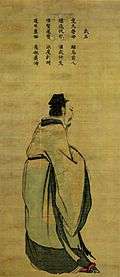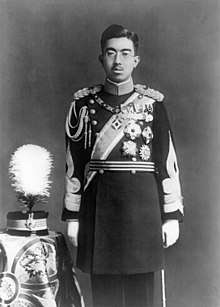Son of Heaven


Son of Heaven, or Tian Zi (Chinese: 天子; pinyin: Tiānzǐ), is the sacred imperial title of the Chinese emperor. It originated with the ancient Zhou Dynasty and was founded on the political and spiritual doctrine of the Mandate of Heaven. The secular imperial title of the Son of Heaven was "Emperor of China".
The title, "Son of Heaven", was subsequently adopted by other East Asian monarchs to justify their rule.
The Son of Heaven was the supreme universal emperor, who ruled tianxia ("all under heaven"). His status is rendered in English as "ruler of the whole universe" or "ruler of the whole world."[1] The title, "Son of Heaven", was interpreted literally only in China and Japan, whose monarchs were referred to as demigods, deities, or "living gods", chosen by all the ancient gods and goddesses.[2]
History
The title "Son of Heaven" stems from the concept of the Mandate of Heaven, created by the Zhou Dynasty monarchs to justify their having deposed the Shang Dynasty. They held that Heaven had revoked its mandate from the Shang and given it to the Zhou in retribution for Shang corruption and misrule. Heaven bestowed the mandate on whomever was most fit to rule. The title held the emperor responsible for the prosperity and security of his people by the threat of taking away his mandate.[2]
The ancient Han Chinese imperial title, tianzi (天子), "Son of Heaven", was later adopted by the Emperor of Japan during that country's Asuka period.[3] Japan sent diplomatic missions to China, then ruled by the Sui dynasty, and formed cultural and commercial ties with China.[4] Japan's Yamato state modeled its government after the Chinese Confucian imperial bureaucracy. A Japanese mission of 607 CE delivered a message from "the Son of Heaven in the land where the sun rises ... to the Son of Heaven in the land where the sun sets."[3] But the Japanese emperor's title was less contingent than that of his Chinese counterpart; there was no divine mandate that would punish Japan's emperor for failing to rule justly. The right to rule of the Japanese emperor, descended from the sun goddess Amaterasu, was absolute.[5]
The Vietnamese also adopted the title, known in Vietnamese as Thiên tử (Chữ Hán: 天子). A divine mandate gave the Vietnamese emperor the right to rule, based not on his lineage but on his competence to govern.[6] Vietnam's adoption of a Confucian bureaucracy, presided over by Vietnam's Son of Heaven, led to the creation of a Vietnamese tributary system in Southeast Asia, modeled after the Chinese Sinocentric system in East Asia.[7]
"Son of Heaven" was often one of several titles adopted by East Asian monarchs. Emperor Taizong of Tang held the Chinese title, Son of Heaven", alongside the Central Asian title, Tengeri Qaghan ("Tenger Khan", or God-like Emperor), which he had gained after defeating the Tujue.[8] Japanese monarchs likewise used a second title, tennō (天皇, "Heavenly Emperor"), that, like "Son of Heaven", appealed to the emperor's connection to Heaven.[9]
See also
- Chinese Tributary System
- Emperor of China
- Sinocentrism
- Pax Sinica ("Chinese peace")
- Tian (Heaven) / Shangdi (God)
- Tian Xia (All under Heaven)
- Tian Chao (Dynasty of Heaven)
- Tian Kehan (Khan of Heaven)
- Tian Ming (Mandate of Heaven)
- Tian Zi (Son of Heaven)
- Zhou dynasty
References
Citations
- ↑ Ebrey 2010, p. 179.
- 1 2 Dull 1990, p. 59.
- 1 2 Huffman 2010, p. 15.
- ↑ Inoue 1993, p. 182.
- ↑ Beasley 1999, p. 29.
- ↑ Woodside 1971, p. 9.
- ↑ Woodside 1971, pp. 234–237.
- ↑ Twitchett 2000, p. 124.
- ↑ Ooms 2009, pp. 154–156.
Sources
- Beasley, William (1999). "The Making of a Monarchy". The Japanese Experience: A Short History of Japan. University of California Press. ISBN 978-0-520-22560-2.
- Dull, Jack (1990). "The Evolution of Government in China". Heritage of China: Contemporary Perspectives on Chinese Civilization. University of California Press. ISBN 978-0-520-06441-6.
- Ebrey, Patricia Buckley (2010) [1996]. The Cambridge Illustrated History of China (2nd ed.). Cambridge University Press. ISBN 978-0-521-12433-1.
- Huffman, James (2010). Japan in World History. Oxford University Press. ISBN 978-0-19-979884-1.
- Inoue, Mitsusada (1993). "The Century of Reform". The Cambridge History of Japan. Cambridge University Press. pp. 163–220. ISBN 978-0-521-22352-2.
- Ooms, Herman (2009). Imperial Politics and Symbolics in Ancient Japan: The Tenmu Dynasty, 650–800. University of Hawaii Press. ISBN 978-0-8248-3235-3.
- Twitchett, Denis (2000). H. J. Van Derven, ed. Warfare in Chinese History. BRILL. ISBN 978-90-04-11774-7.
- Woodside, Alexander (1971). Vietnam and the Chinese Model: A Comparative Study of Vietnamese and Chinese Government in the First Half of the Nineteenth Century. Harvard University Press. ISBN 978-0-674-93721-5.